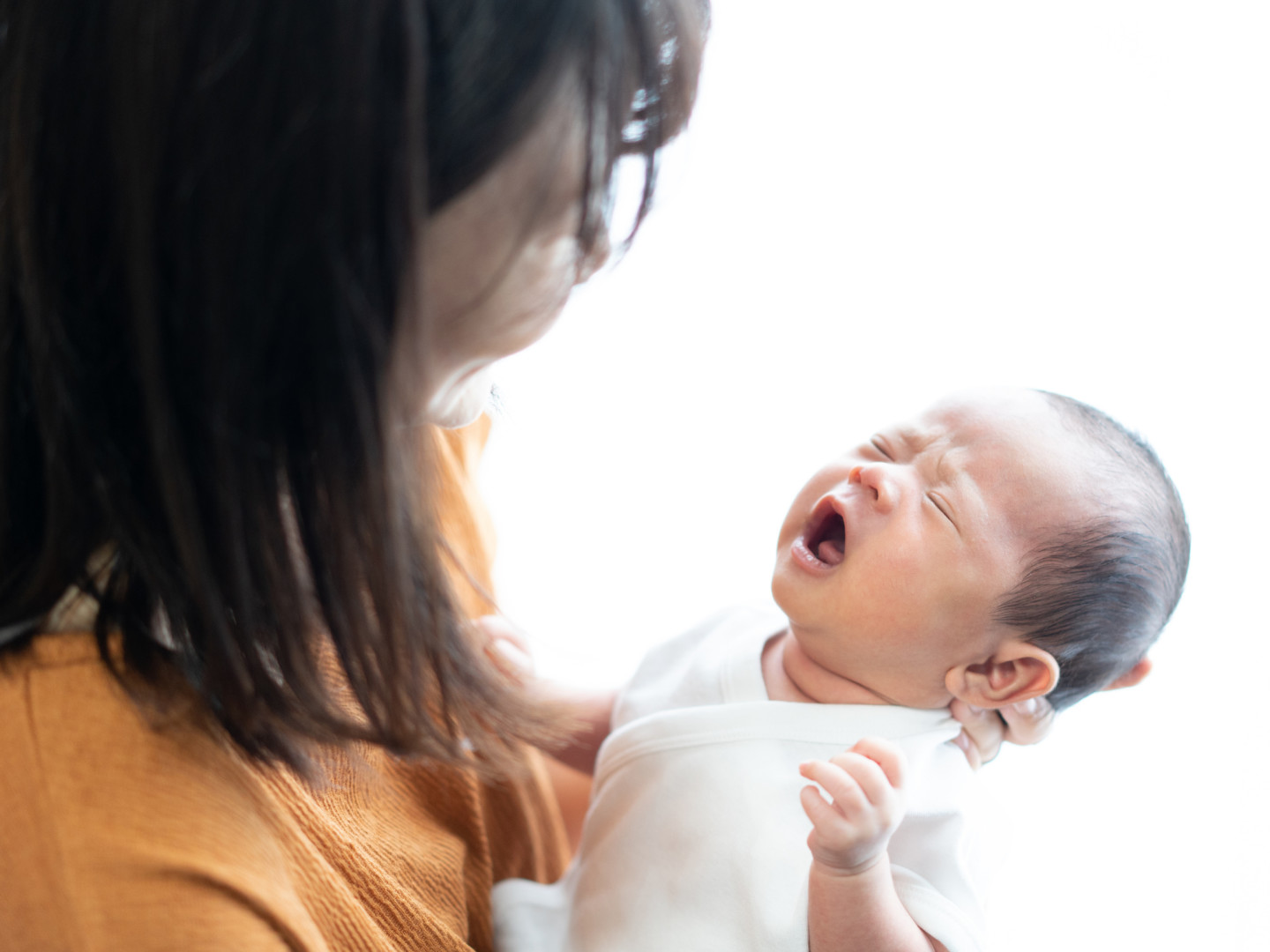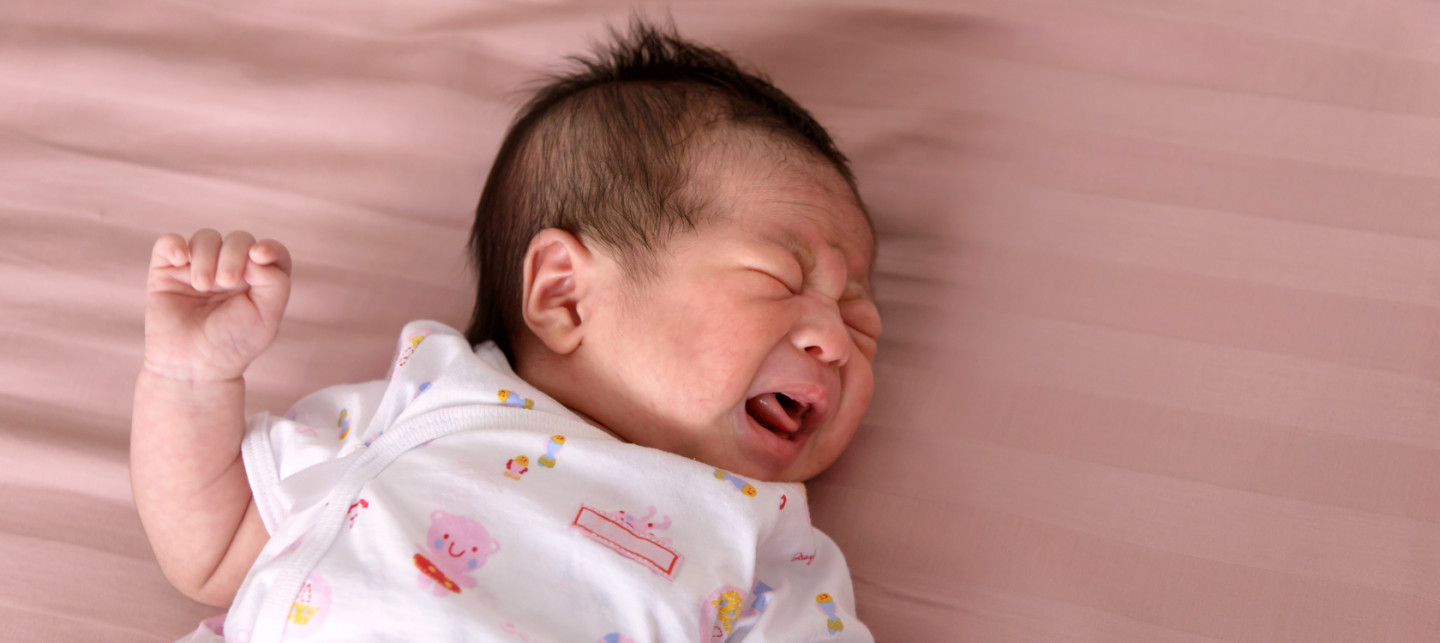Baby Briefly Acts Like She's in Pain While Asleep
3 reasons why your baby is crying in their sleep: Causes and tips

Have you lot ever checked on your baby to run into why they're crying, and found them still - somehow - asleep? If so, you're non alone in feeling confused about why babies sometimes cry in their slumber. Just another mystery about the littlest humans, parents are oftentimes unsure how to reply when their baby is sleeping with their eyes airtight, all the same crying out.
Babies crying in their sleep can exist alarming for many parents, and leads to questions about babies having nightmares, or being hungry, as well as how to assist a crying infant render to a peaceful deep sleep. Understanding the most common reasons babies weep while still asleep will assistance y'all know what to practice the next time your footling one begins screaming or crying in their sleep.
IN THIS Commodity:
-
Why practice babies cry in their sleep?
-
The 3 about common reasons why babies cry in their sleep
-
Tin babies have nightmares?
-
Is a infant crying in their slumber something to worry about?
-
How to help a crying baby fall asleep

Why do babies cry in their sleep?
Although information technology's not mutual for babies to cry in their sleep, it does happen. Some parents plough on the monitor when they hear their babe cry out, only to be surprised to come across their baby's eyes are closed. Other parents may get to cheque on their babe, only to have the crying of a sudden stop, and find their baby fast asleep. This behavior may have you lot scratching your head, or wondering if something is wrong. Understanding the reasons babies weep in their sleep can help you lot know what to look for and how to assistance your baby.
The 3 most common reasons why babies cry in their sleep
-
Crying whileastward transitioning from one sleep cycle to the next
Like adults, babies sleep in cycles. Merely unlike adults, babies transition between sleep cycles very chop-chop, spending more time in REM sleep (also referred to as agile sleep) than deep sleep. During this stage, y'all may notice your baby's eyes moving a lot under their eyelids (this is where the term 'rapid centre motility,' or REM, comes from). Babies can even be seen moving their arms and legs, closing and opening their hands, twitching or jerking, or yeah, even crying during REM sleep.
With sleep cycles lasting just 40 minutes on average, many babies volition feel a cursory enkindling at the terminate of each sleep cycle. During this brief enkindling, babies may cry for a few minutes and put themselves back to slumber, or may non fifty-fifty fully awaken.
-
Crying due to overtiredness
When babies don't get plenty sleep, or are awake longer than they can comfortably manage, they can quickly become overtired. Overtiredness triggers fatigue-fighting hormones, which can go far fifty-fifty more challenging for babies to fall and stay comatose. Yes, it seems counter-intuitive, and yep, information technology can exist a struggle. Overtiredness and large tears just before falling to sleep are the most common reasons your baby may be crying in their sleep.
-
Crying due to teething pain
When teeth buds begin emerging, babies may exist very uncomfortable — and they'll let yous know it. Teething babies are noticeably fussier, and will often whine due to the discomfort both day and night. If you suspect your baby may be working on a new molar, you lot might notice more frequent mild crying or whimpering while sleeping. Ask your kid's pediatrician what they recommend for discomfort associated with teething.
Unless you're concerned for their safety, it's a skilful idea to wait and lookout earlier intervening when your baby is crying in their sleep. When y'all respond too rapidly, you may inadvertently wake your child all the style up, or prevent them from falling dorsum to sleep on their own.
Cursory episodes of crying during sleep are developmentally advisable and okay, and don't necessarily crave help. Then, the next time you discover your babe is crying, just with eyes airtight, accept a petty step dorsum and wait to see what happens next. Your baby may surprise you lot, and stop crying all on their ain!
Can babies accept nightmares?
Well-nigh of usa have watched our babies sleeping and wondered, "What are they dreaming virtually?" In reality, those sweet smiles y'all might catch your baby giving in their sleep are involuntary, and not in response to a dream (just we tin can imagine, right?). Dreaming begins later in life, typically around age two. The good news? Babies don't experience bad dreams, nightmares or night terrors, and crying in their sleep is likely linked to the reasons listed higher up.
Is a babe crying in their slumber something to worry about?

Occasional crying during sleep isn't usually a cause for alarm. Even still, most parents want to do everything they can to ensure their baby sleeps peacefully. Afterall, if your infant is often screaming or crying in their sleep, they may be able to sleep through information technology - just you may not.
Newborns
Thank you to their still-developing nervous organisation and frequent need to eat, newborns wake more than frequently than older babies, and this includes more sleep disturbances similar crying without being fully awake. Newborns are likewise less likely to take the skills to settle themselves to sleep (and back to slumber) without help.
If your baby wakes upward crying, or is randomly crying while sleeping, and you know they're not hungry or needing a diaper change, at that place may be other solutions earlier becoming too concerned.
Ensuring your baby isn't too hot or cold during sleep times can help your baby sleep more than comfortably. Experts recommend setting the temperature between 68℉ and 72℉, and caution confronting dressing babies in heavy layers.
Usually whatever you're wearing plus one layer is sufficient (e.g. a long-sleeved sleeper and slumber sack). If your newborn is crying in their sleep, do a quick check of their slumber environment and meet if this helps settle them.
Infants
After the newborn period, babies go through a lot of developmental changes, including changes to how they sleep; we're guessing you've heard of the 4 month sleep regression, or the as dreadful 8 calendar month sleep regression. Many parents decide to begin working on more independent sleep once their baby is by the newborn stage and closer to 6 months.
Babies who are simply learning to sleep on their own may struggle more with transitioning betwixt sleep cycles and self-soothing, meaning it'southward worth giving your baby a few minutes to see if they'll settle on their own if you hear them crying in their slumber.
Nosotros know information technology'southward hard to wait when yous hear your baby fussing in their sleep, but whining and whimpering during sleep is quite common, and many babies will fall dorsum to sleep in minutes if given an opportunity - letting you do the same.
Toddlers
There'south a less talked virtually sleep regression that tin can occur around a child's kickoff birthday (and you thought you were in the clear…). The 12 month sleep regression can spell trouble with naps and nighttime; toddlers are also known for testing limits and resisting naps - a difficult combination. Any slumber loss acquired by early morning rising, missed or short naps, and later bedtimes can lead to overtiredness.
If your one year old is crying uncontrollably at night, you're not alone! Toddlers who are overtired volition cry more before falling comatose, and may weep briefly betwixt slumber cycles. Oftentimes, if toddlers are given a lovey or stuffed animal to slumber with, they'll chop-chop seek condolement in the lovey and settle on their own without fully waking up, and put an end to your toddler crying in sleep.
How to help a crying babe to slumber
Here are a few tips to help your baby finish crying and settle downwards enough to fall asleep
Tip #1: Condense your usual bedtime routine
If you sense your baby is overtired, it'south best to condense your usual bedtime routine and help your infant brainstorm to settle to sleep quickly. A baby that's melting downwardly during the bedtime routine ofttimes needs to slumber. Sometimes they're crying merely because they're tired! If your baby seems very tired it is OK to skip some steps of your usual bedtime routine or speed up the routine.
Bedtime routines for newborns should be brief (approximately 10 minutes) and include merely a few activities such as irresolute the babe's diaper, applying lotion or a soothing massage, swaddling or changing into pajamas, and rocking for a few minutes until drowsy.
Bedtime routines for older babies are commonly slightly longer (approximately fifteen-30 minutes) and may include additional activities such as reading 1-ii books or singing lullaby songs.
Tip #two: Lay on the soothing
When a baby is very upset it is helpful to actually lay on the soothing. You can try turning on white noise and brainstorm shushing or singing to your babe. Many babies besides settle downwards faster and will end crying when rocked or bounced. If your baby takes a pacifier you can also apply the pacifier to help your baby finish crying.
If you are breastfeeding you may notice bringing your baby to the chest to condolement nurse for a bit puts an cease to crying, fifty-fifty if they are not hungry. Nursing is very soothing for babies and the closeness to mom will bring down their heart rate and prepare them for sleep.
Tip #3: Be patient
Calming a crying baby may accept some time, and they may take longer than usual to fall asleep: be patient. If there is more than one caregiver, consider taking turns with the baby. Once your baby has stopped crying, now's the time to endeavor to put your baby to sleep.
Baby Briefly Acts Like She's in Pain While Asleep
Source: https://huckleberrycare.com/blog/reasons-why-your-baby-is-crying-in-their-sleep-causes-and-tips

0 Response to "Baby Briefly Acts Like She's in Pain While Asleep"
Post a Comment